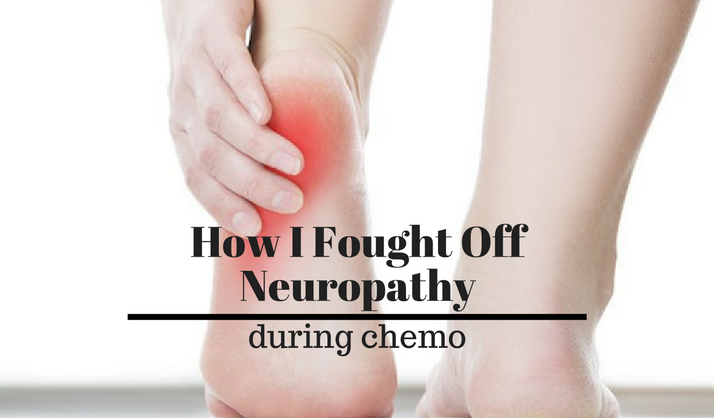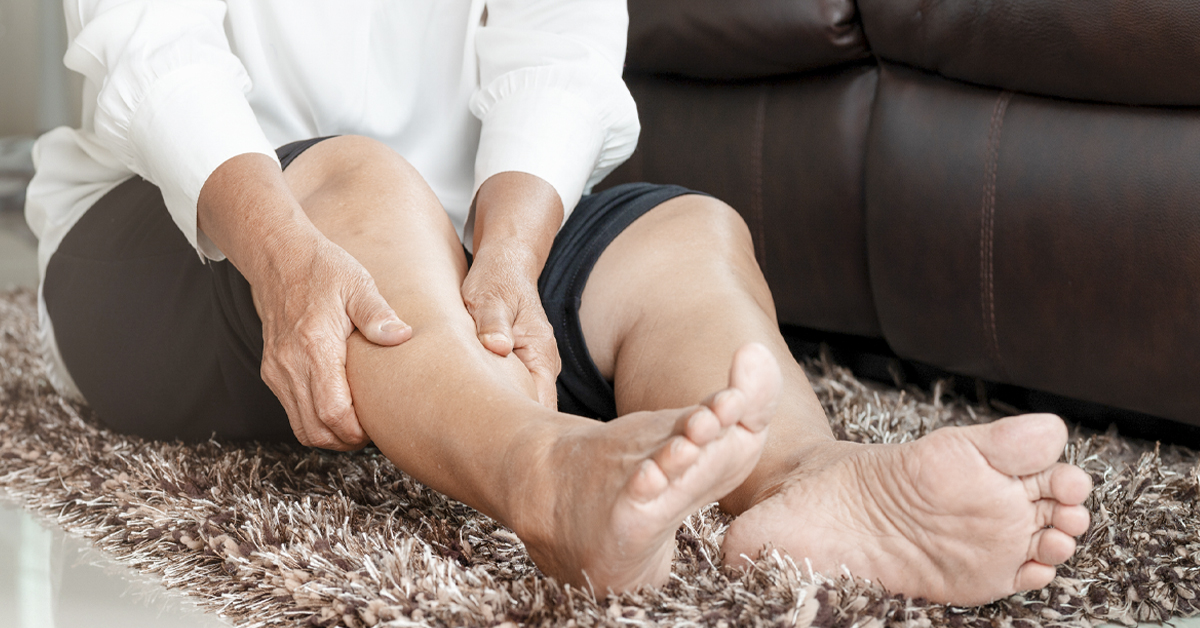Janice F. Wiesman, MD, FAAN, describes the signs of nerve damage in ‘Peripheral Neuropathy: What It Is and What You Can Do to Feel Better.’
What is peripheral neuropathy?
Your body has a network of nerves that send messages from your brain and spinal cord to other parts of your body. Different conditions, such as carpal tunnel or diabetes, could lead to nerve damage called peripheral neuropathy that affects almost every area in your body, from your muscles to your internal organs. Symptoms could feel mildly uncomfortable or be disabling to those with the condition, and Dr. Wiesman describes the signs in the book Peripheral Neuropathy.
Your feet and legs feel tingly
Often, the first symptoms of neuropathy have to do with the sense of touch. Your extremities might feel like they’re tingling, burning, itching, shooting, or like ants are crawling on you. “Normal stimulation of the skin, such as a light touch of clothing or bedsheets on the legs, can feel uncomfortable or painful,” writes Dr. Wiesman. You’ll probably feel these sensations first in your toes and feet, which are at the ends of your longest nerves. Eventually the feeling will make its way up your ankles and legs. By the time it reaches your knee, your hands, which are about the same length as them, will also get involved. (Try these home remedies for restless leg syndrome if your tingling is from RLS.)
You experience numbness
When information about sensation in the feet or joints doesn’t reach your brain, you’ll stop feeling those parts of your body. You might even feel off-balance because your brain can’t figure out where you are in space. “People with neuropathy wonder how their feet can feel numb and painful at the same time,” writes Dr. Wiesman. “The answer lies in the different functions of the various sensory nerve types.” Some of the axons that send information from the nerve cell fire impulses randomly, which the brain interprets as tingling or pain, while others can’t deliver information to the brain at all, leading to numbness. Here’s why you should never ignore these types of pain.
You feel weak
Unlike the general fatigue you experience when you’re tired, weakness from peripheral neuropathy affects specific muscles. (Don’t miss these signs of chronic fatigue syndrome.) Without enough axons stimulating the cells, your muscles can’t tighten as strongly as they used to. What’s more, the muscles might shrink because there are fewer working nerve endings to help stimulate growth. At first, you might feel weakness in your feet and find it difficult to stand on your toes or heels. As the neuropathy progresses, you could have a hard time picking up and holding on to objects. “Distinguishing between weakness and loss of sensation is important,” writes Dr. Wiesman. “With loss of sensation, it is difficult to know how firmly the hand is gripping an object, and it can seem like weakness when an object falls out of a numb hand.”
You feel lightheaded
Right after standing up, a person’s blood pressure typically will drop, then spike back up quickly to just higher than normal. To compensate, nerves trigger arteries to narrow and the heart to pump faster, which both result in a higher blood pressure. “If these mechanisms are insufficient to raise blood pressure enough to pump blood to the brain, gravity takes over and pulls the blood down into the legs,” writes Dr. Wiesman. That’s why if peripheral neuropathy is messing with your nervous system, you might feel lightheaded—or even faint or fall—if you’ve been standing or exercising. Watch out for these signs you’re about to faint.
Your hands and feet are cold
Autonomic nerves—which are responsible for functions you don’t consciously control, like your heartbeat and digestion—can affect how wide the arteries are. Often with neuropathy, those nerves will make your arteries narrower, decreasing blood flow to your feet and making them feel cold. Don’t miss these other medical reasons you always feel cold.
Your mouth feels dry
Enzymes in saliva kick-start digestion by breaking down food in your mouth. When your nerves are functioning properly, they’ll make you salivate when you see, smell, or even think about food to prepare you for eating. Without enough nerves to prompt that process, you’ll have less saliva, so your mouth will feel dry. “In addition to feeling uncomfortable, dry mouth can lead to problems with swallowing as well as cavities and growth of bacteria in the mouth,” writes Dr. Wiesman. Try one of these natural remedies for dry mouth.
You have dry eyes
Autonomic nerves also cue your eyes to create the tears your eyes need to flush out dust and dirt, and stay lubricated. Dry eyes aren’t just uncomfortable—they also put you at a higher risk of scratching your cornea or developing an infection. Never ignore these symptoms of dry eye syndrome.
Your face is sweaty
Sweat helps regulate your body temperature, but neuropathy can make it harder for your legs to produce sweat. To make up for it, your body could get sweatier in other parts of the body like the face, underarms, or back. You might also find it harder to tolerate high temperatures. Here are more things your sweat says about your health.
Your skin and nails are changing
Autonomic nerves affect the glands that produce oil for your hair, skin, and nails. When the nerves aren’t functioning, those areas can’t get the lubrication they need, resulting in hair loss, dry skin, and ridged and brittle nails. Check out these other things your nails can tell you about your health.
Everything seems out of focus
Tiny muscles in your eyes help your iris change size to let more or less light in, and make your lens contract or relax to focus on objects that are close or far away. When your autonomic nerves aren’t working well, your eyes will have a hard time adjusting to light or focusing on images, particularly close-up ones. (Quit these habits that strain your eyes.)
You have bladder dysfunction
Nerve endings in the wall of your bladder signal when your bladder is full. When those nerves aren’t functioning properly, you’ll have a harder time recognizing when your bladder is full, and difficulty controlling the muscle that lets pee out. You might strain to pee, and still end up with leftover urine, causing the bladder walls to stretch. Eventually, you might find yourself leaking urine or develop a urinary tract infection. Read more about what your bladder wishes you knew.
You’re having digestive problems
About 100 million nerves in your autonomic nervous system help your food move through your esophagus, stomach, and small and large intestines. “If that system is not working correctly, the esophagus will not propel food from the throat into the stomach, giving a feeling of something being caught in the throat,” writes Dr. Wiesman. Plus, you could feel fullness, nausea, or abdominal pain even after small meals if your stomach holds on to food instead of sending it along to the small intestine. In turn, bowel issues could lead to diarrhea, constipation, or both. Stay away from these foods that are bad for digestive health.
You can’t get in the mood
“Sexual dysfunction is a common problem early on with autonomic neuropathy,” writes Dr. Wiesman. The nerves that normally help blood vessels in the penis or clitoris fill with blood, or trigger lubrication of the vagina aren’t working properly, making it harder for both sexes to get aroused or have an orgasm. Don’t miss these other medical reasons your sex drive is low.
Your blood sugar is low
Normally, your autonomic nervous system causes sweating, fast heart rates, or shakiness to signal when your blood sugar is low. When it’s not functioning properly, your body won’t be able to alert you, so you could have low blood sugar without knowing to help it. If you do recognize it, try these tricks for treating low blood sugar.
You have a silent heart attack
During a heart attack, a blocked artery keeps blood from getting to part of your heart, and your autonomic nerves signal the pain. Peripheral neuropathy makes heart attacks even more dangerous because you don’t have the pain signals to feel that something is wrong. Find out signs you’re headed for a heart attack.
Want to learn more about peripheral neuropathy?
Janice F. Wiesman, MD, FAAN, is an associate clinical director of neurology at New York University School of Medicine and adjunct assistant professor of neurology at Boston University School of Medicine. She’s spent 20 years helping people with neuropathy, and you can find more of her advice in Peripheral Neuropathy: What It Is and What You Can Do to Feel Better.





